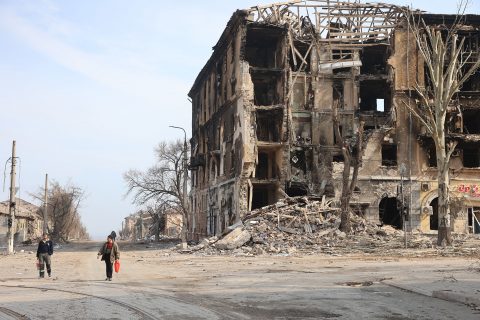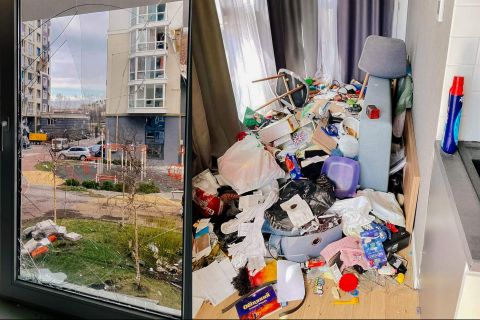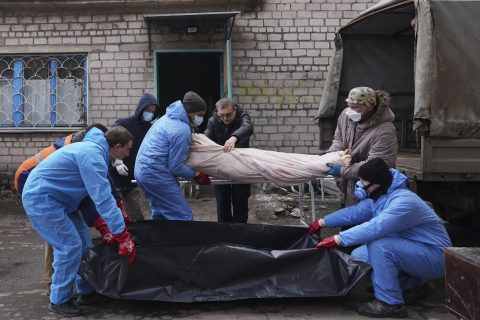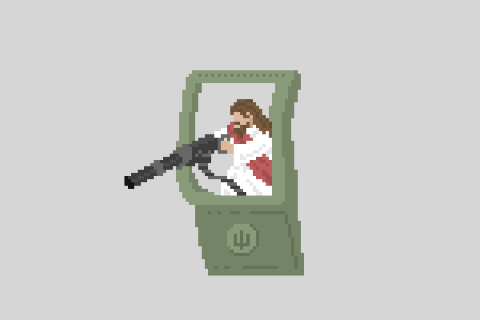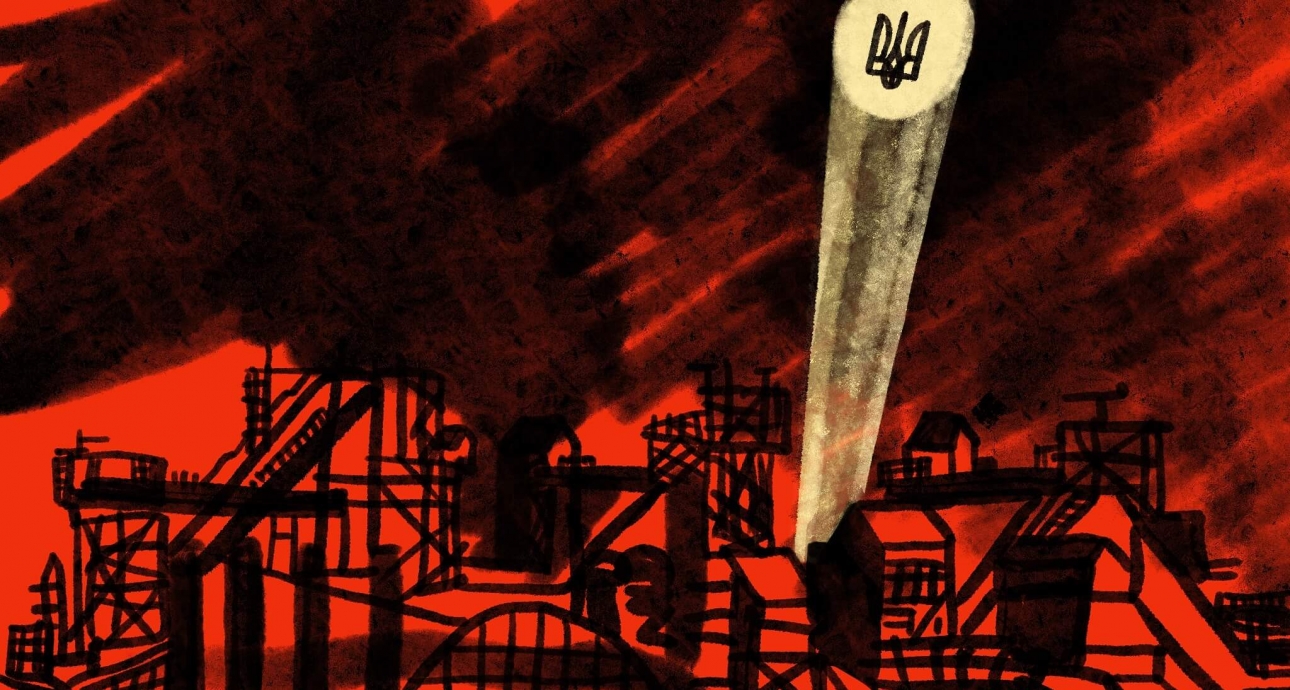
“It’s Like Watching a Live Stream from Hell” — Daughter of the Azovstal Defender Talks about Her Father
The Ukrainian military has been holding the Azovstal territory since the beginning of March. Despite heavy artillery shelling and airstrikes, Azov soldiers kept defending the plant and had no intention to surrender. At the end of April, the situation had drastically deteriorated. The Russian army has blocked Azovstal, food and medical supplies have almost run out, and the number of injured people has reached 600. On April 27, Azov soldiers said, that they will accept evacuation by a third party. Since the beginning of May, almost 500 civilians were evacuated from Azovstal, but the military remain captured.
Bird in Flight talked to the Azovtstal defender’s daughter, who preferred to stay anonymous. She told us how the Ukrainian soldiers survive on the seized plant and what helps their families to hold on.
I can only imagine what you must feel when reading the news about Azovstal. How are you holding on?
I have no other option. I hope for a miracle and believe that everything is going to be all right. If I begin to doubt it, I’ll lose my mind.
I live with a mobile phone in my hands and keep reading the news. Once I saw a video, which showed an alleged bombing of Azovstal. There was a massive explosion, no one would survive it. While Azovstal is being bombed nonstop, it eventually turned out that the video was filmed somewhere else. But we were worried sick. We thought that everyone got killed, including my father. I’d like to ask all journalists and bloggers to check the information before publishing. Bad news hit the families of the Azovstal defenders hard. It is also important to talk about people from other military units, not only Azov.
How did your father end up at Azovstal?
My father is in the armed forces. He had been in Mariupol till the middle of March, and then he hid in Azovstal together with other soldiers and civilians.
When was the last time you talked to him?
A month and a half ago, when he was in Mariupol. We used to exchange short and rare phone calls, and then the signal was lost.
Now we send text messages to each other. My father writes a message and gives his phone to a friend. The friend then goes to a place, where they can pick up a signal, and sends me the text. Sometimes my father goes out on his own. He sends me a message and rushes back under shelling. After that, I keep thinking restlessly about whether he made it to the shelter or not. I really want to see his pictures, but I know that they are not allowed to send photos.
What does your dad tell you?
He says that he loves me and asks me to be careful. He also asks about the news. The news is the most important thing for those, who stay there. They want to hear the words of hope.
On my birthday, he decided to give me a present. For days, he searched for a signal to send me money. I begged him not to do that, but dads will be dads.
Apart from my father, there are also my childhood friends trapped on the territory of the plant. I talk to them from time to time; they dream about their future jobs and recall the parties that we had in the past. They need these talks to get distracted if only for a minute.
They keep asking me about my day. I feel awkward answering that question. Imagine this: you spent your day cycling, and they spent their days in hell. But again, they need to know that peaceful life still exists. That’s what they are fighting for.
It’s weird to see these messages from hell alongside other texts from my friends and colleagues. It’s like I’m watching a reality show.
How is your dad feeling now?
During the war, I saw him crying for the first time. He wasn’t afraid, he just needed to release the tension. Now he’s holding strong.
During the war, I saw him crying for the first time. He wasn’t afraid, he just needed to release the tension.
People at Azovstal are amazingly calm. They realize the whole “complexity” of the situation, but they still believe in miracles.
Previously, the Ukrainian officials used to announce certain dates, when the help would come. For soldiers, they were like beacons of hope. Now there are no dates announced, and that’s the hardest part for them.
How do you cope with this situation?
The situation is getting worse, and I’m feeling worse too. But I’m holding on. When the feeling of terror is creeping on me, I give out a small sob and then calm down. That’s my way of crying — just a second per day. Our defenders go through unimaginable hardships. And we have no right to be weak.
It’s harder for my mom. She fled Mariupol in March. My father managed to sneak out to our place and persuaded her to leave. If he didn’t do that, she would have stayed. She refused to leave him there till the last moment.
My mom went to the western part of Ukraine. At first, she was a complete mess. She walked the city and didn’t understand which street she was on. And she used to hike, so she had a perfect sense of direction back in the day.
I’m lucky — I can talk to my father and my friends. Unlike many other families, at least I know that they are alive. Mothers suffer the most — it is unbearable not to know what happened to your child. Everyone has their ways of coping — someone puts on a brave face, someone cries all day long.
Why some people can call their relatives, while others can’t?
The Azovstal territory is huge. It’s like a city inside a city. People can pick up a signal in some parts of it, while others have no connection at all.
Do they have food?
Once, my dad bragged that he collected 100 liters of rainwater. It’s not much considering the number of people. Later, he texted me that they can only drink about 200 grams a day. They still have food, but they haven’t eaten bread for about 40 days.
Once, my dad bragged that he collected 100 liters of rainwater.
Are there many casualties?
There are casualties, but people, who stay at Azovstal don’t know the whole picture. The military is located in different parts of the plant.
How did you feel about the evacuation of civilians?
On one hand, I’m glad that people were able to escape. On the other hand, I realize that soldiers’ chances to survive decrease with every civilian leaving the plant. The Russian army knows no mercy, and they will demolish the plant once all civilians are out.
The President talks a lot about the evacuation of civilians, but we need to save our soldiers too! They lost their army friends, and they need help. But we realize that there are no military ways to save them. So we have to rely on diplomatic solutions. The families of the Azovstal defenders do their best to influence this process. We make posts online, we give interviews to international media. European politics depend on their electorate. It means that raising public attention can prompt them into action.
What do the officials say?
It’s a sensitive topic. I don’t want to sound pessimistic, but I do have some questions for our officials. For instance, we know certain ways to help the Azovstal defenders, but our efforts are being hampered by some authorities.
We know certain ways to help the Azovstal defenders, but our efforts are being hampered by some authorities.
I don’t want to get into detail. But every public servant should remember that after the war they will be responsible for their action or inaction.
What will you say to your dad when you see him?
My grandmother and grandad refused to leave Mariupol, they are waiting for my dad. Since our apartment is ruined, they hope that he will go straight to their place as soon as he escapes Azovstal. I’m very worried about my grandparents, but at the same time, I’m glad that my father will have somewhere to go. When I see him, I won’t say a word, I will just hug him. I don’t even need to see him — just to know that he has escaped.
Illustration: Mari Kinovych.
New and best
